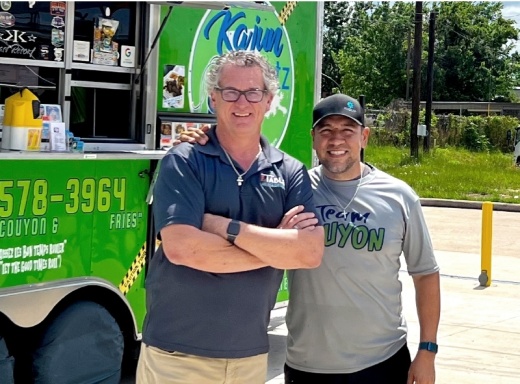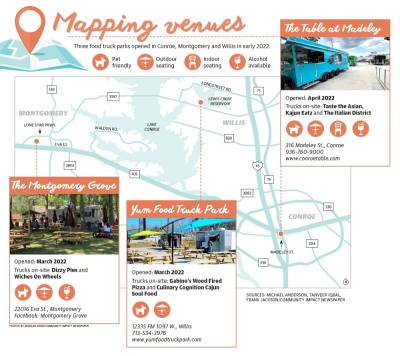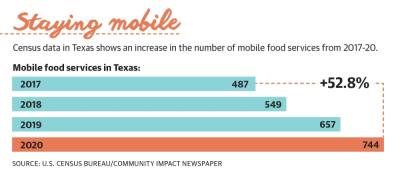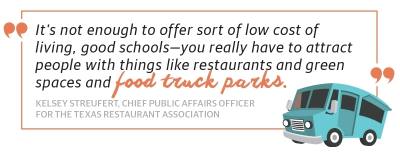With three food truck parks recently opened in Montgomery, Conroe and Willis, a number of food trucks have found their home in the area. Along with requiring lower startup costs for prospective business owners, food truck owners said they believe food trucks have been a good dining option for customers during the pandemic, offering an alternative to sit-down dining.
Kelsey Streufert, chief public affairs officer for the Texas Restaurant Association, said the increase in food trucks is a national trend, especially in Texas, where the population is booming and looking for innovative culinary concepts.
“We have more and more families moving here. We have more and more people wanting things to do,” Conroe City Council Member Todd Yancy said in an interview. “If you go to all these other towns around here, now they’re really fixing up their downtown area. To me, it’s fun for [residents] to go to different kinds of food and really giving more people a reason to move here.”
Finding a home
Montgomery City Administrator Richard Tramm said with many residential and retail developments under construction and ongoing population growth in Montgomery, food trucks have come to the area to meet demand.
“I think it’s really just a matter of these vendors seeing where the people are; plus we were already trending toward an increased number of outdoor events in Montgomery before the pandemic,” Tramm said.
Frank Jackson—owner of The Table at Madeley food truck park in Conroe, which opened in April—said he wanted to give food trucks a home in Conroe and also provide utilities such as water, electricity and dumping facilities for the mobile trucks.
“I just wanted to create that space to give [food trucks] a way to do business,” Jackson said. “I thought it was a good business model for me to be able to sell drinks and let them deal with the food. Most restaurants’ biggest expense is the food and the kitchen, and so I kind of eliminated that.”
Jacob Irving—a junior at Lake Creek High School in Montgomery and owner of Pop Pop’s Dandy Dog food truck, which is set to open June 3 along Caroline Street in Montgomery—said food trucks save on costs that restaurants cannot, such as rent and extra employees.
“Over the years, the food truck parks have been popping up, and also the food trucks, you see them everywhere,” said Tanveer Iqbal, owner of Yum Food Truck Park in Willis, which opened in March. “There’s a lot of development in the Willis area, so we figured we’d take advantage of the opportunity and introduced a food truck park [to Willis].
Adapting to the pandemic
Michael Anderson—owner of the Dizzy Pies and Wiches On Wheels food trucks, which were previously located at Deacon Baldy’s food truck park on FM 1488—opened The Montgomery Grove food truck park in March in Montgomery; a restaurant is in the works at the park, too. He said food truck parks provide a consistent place of business, and while the pandemic affected most businesses, having the option of to-go food was helpful.
“[Food trucks] helped us during COVID[-19] because people in their mind didn’t want to go to a restaurant and sit down, so they came to a food truck,” Anderson said. “But the reason we were picked a lot was people knew exactly where we were going to be.”
Also, Streufert said she believes food truck parks are an attraction for a city.
“It’s not enough to offer sort of low cost of living, good schools—you really have to attract people with things like restaurants and green spaces and food truck parks,” Streufert said. “So I think that’s part of why we’re seeing more of an investment in that. People value it. People want to live in cities that have those kinds of amenities.”
In addition, Iqbal said rising construction costs and the option of providing an open-air area made it easier to choose a food truck over a brick-and-mortar restaurant.
“Food truck parks are outdoors, so there’s no problems with ventilation or social distancing,” Iqbal said.
City ordinances and permits
With the recent popularity of food trucks, both Conroe and Montgomery have passed ordinances to address things such as operation times and locations for trucks.
In May 2021, Conroe City Council approved amending an ordinance so food trucks could no longer operate in downtown—east of Hwy. 75—but also extended operating hours for food trucks from two hours to six hours elsewhere in the city. Director of Community Development Nancy Mikeska said it has been difficult to enforce the ordinance on the weekends with few staff, but the city is working on hiring code officers and telling food trucks how they can be compliant.
“[Food trucks are] new to us. It’s new to Conroe in the last year or so, and the council has worked very hard on making this a viable business option,” Mikeska said.
Mikeska said the city has not received complaints about noncompliant food trucks but plans to revisit the ordinance in the future.
In Montgomery, Bill Clevenger, owner of food truck Texas Twist & Shakes, said he had no problems with the county when complying with permits and ordinances, but the city of Montgomery had considered an ordinance that would have prevented Texas Twist & Shakes from opening even though it had already been approved to open.
“We invested all the capital and resources, time, effort, money to get to the point to open, and then [City Council] was trying to stop us before we even opened,” Clevenger said.
The ordinance amendment, which did not pass in September, would have required mobile food units to have a special-use permit, operate between 9 a.m.-7 p.m., avoid parking within 50 feet of any street corner or sidewalk, and avoid sales within 1,000 feet of a school.
“Previously, we had no real specific permitting to an in-city festival [relating to food trucks]. Now that we have a year and a half of data we have the ability to go back and refine that [ordinance] and improve it,” Tramm said.








